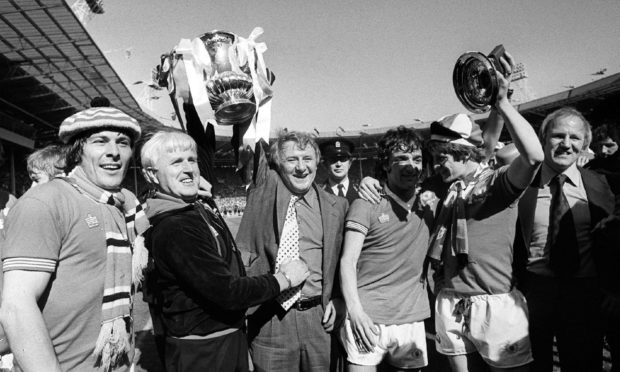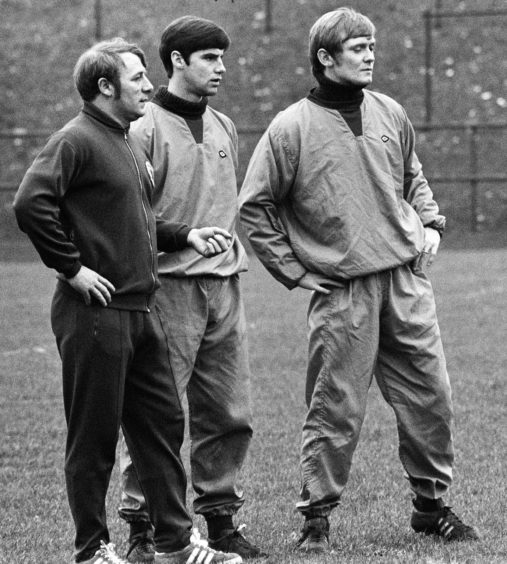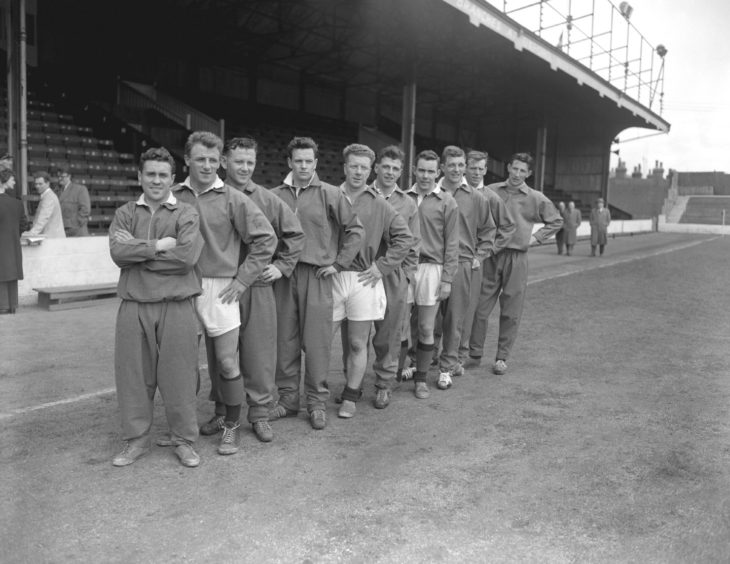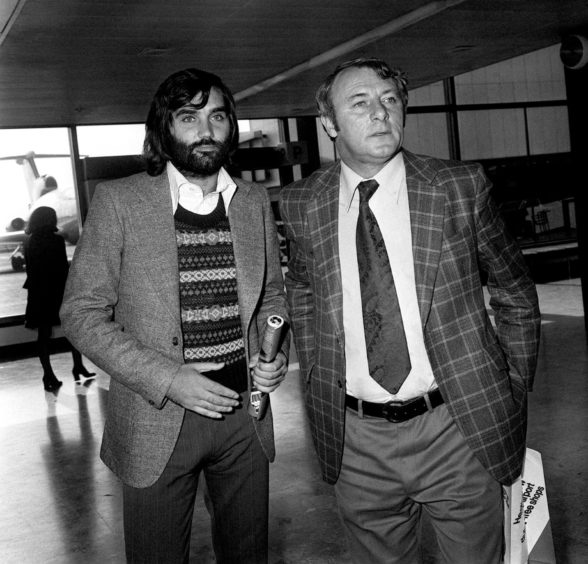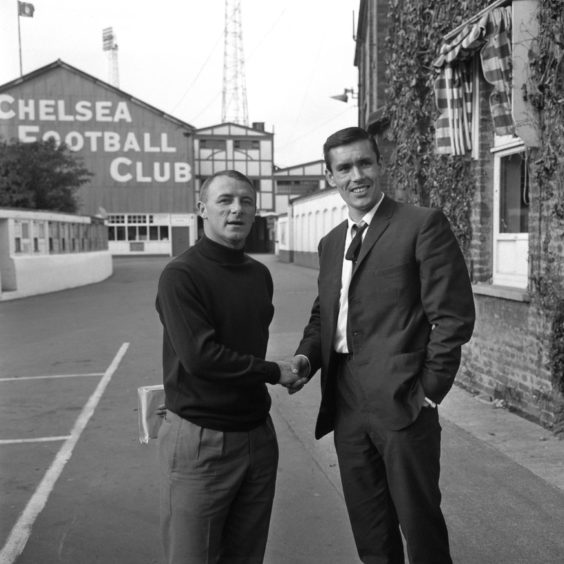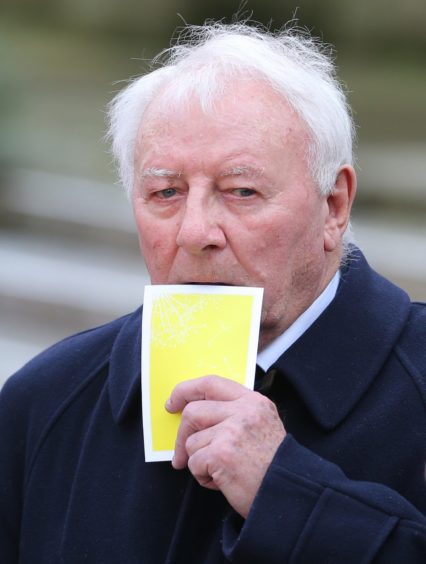Tommy Docherty, the man who played for and managed Scotland and a host of other clubs, has died at the age of 92.
The larger-than-life Glaswegian, who was never afraid to air his opinions and spark controversy, was one of the great football figures from the 1950s to the 1970s, whether performing for Celtic, Preston North End, Arsenal and Chelsea, or rising to prominence as a manager when he took over from Ted Drake at Stamford Bridge and assembled an exciting team of youngsters, including Terry Venables, Barry Bridges and Peter Bonetti.
World Cup
The Doc, as he was universally known, won 25 Scotland caps and was part of the squad which participated in the 1958 World Cup in Sweden.
An extrovert with a penchant for the finer things in life, he did his National Service in the Highland Light Infantry, as the prelude to beginning his career at Parkhead and then moving to Preston in 1949.
Docherty packed a lot into his CV, but admitted to having regrets about leaving the Scotland coaching set-up after bringing together the players who qualified for the 1974 World Cup in Germany, where the SFA’s finest were eliminated without losing a game.
At the time, he argued he couldn’t turn down the chance to move to Manchester United, even though the Red Devils were in steep decline from their glory days in the 1960s.
Stupidity
But he later said: “That was the biggest mistake I ever made. It was partly greed and partly stupidity after [Sir] Matt [Busby] asked me if I wanted the job.
“Man United offered me £15,000 which was a lot of money at the time. I was DD – Daft Doc – and I ended up being in the right place at the wrong time.
“Mind you, I was getting a bit too strong at the SFA and I don’t think they liked that either. I had a contract with Scotland, and they could have held out and told the Old Trafford board they wanted some compensation.
We are deeply saddened by the passing of Tommy Docherty, who led us to FA Cup victory in 1977 with a thrilling, attacking team in the best traditions of Manchester United.
Everyone at the club sends sincere condolences to Tommy’s loved ones. pic.twitter.com/KLRsRJwIIv
— Manchester United (@ManUtd) December 31, 2020
“But they didn’t and I think they were quite glad to get rid of me.”
The feisty Scot’s tenure at United was blighted by George Best losing his lustre, Bobby Charlton announcing his retirement and Denis Law leaving to join Manchester City.
Yet, although Docherty was forced to deal with relegation and tasked with orchestrating promotion back to the top tier, the majority of the Stretford End supporters relished his tough-as-teak, take-no-prisoners approach and they cheered to the rafters when he led United to glory over Liverpool in the 1977 FA Cup final at Wembley.
However, his reign ended abruptly when Docherty’s affair with the wife of club physio, Lawrie Brown, was splashed all over the tabloids. Docherty and Mary Brown subsequently married and the couple were together for more than 40 years.
Storm in a teacup
It was a scandal which proved a storm in a teacup and he continued his career in different parts of the world, taking charge of Derby County, Queens Park Rangers, Sydney Olympic and South Melbourne in Australia, in addition to briefly returning to Preston North End, Wolves and Altrincham before retiring from management in 1988.
A natural performer and raconteur, he became a popular TV pundit and after-dinner speaker and was never afraid to ruffle feathers. Despite his admiration for Sir Alex Ferguson’s achievements at Old Trafford, there was no love lost between the duo.
Docherty revealed: “Fergie is the greatest manager ever, but I couldn’t honestly say I know him at all. He doesn’t agree with anything I do, obviously, and I don’t agree with a lot of things he does. Personally, I think that he is a bit of a bully.”
Glasgow boy at heart
Nonetheless, he was still laughing and joking into his tenth decade. When the BBC’s Garry Richardson asked him how he was feeling about reaching 90, he replied: “If I’d known I was going to live so long, I would have taken better care of myself.”
And, while he spent most of his career in England, Docherty never ever forget his roots.
As he said: “I’m still a Glasgow boy at heart and I wouldn’t change that for all the tea in China. It’s always great returning home and I’ve got so many great memories from the early days when it all started.
“Back in 1947, I came back from my National Service in Palestine on the Saturday, went to York on the Sunday to get demobbed and then signed for Celtic on the Monday.
“That was quite a weekend. You never forget something like that.”
